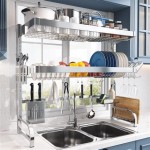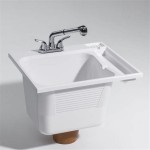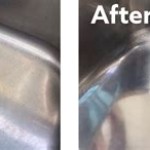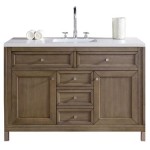Sink Filters for Hard Water: Understanding and Mitigation
Hard water, characterized by a high concentration of dissolved minerals such as calcium and magnesium, presents a range of challenges in residential and commercial settings. These challenges include scale buildup in plumbing and appliances, reduced effectiveness of soaps and detergents, and potential skin irritation. Addressing hard water problems directly at the point of use, specifically at the sink, can offer a targeted and cost-effective solution. Sink filters designed for hard water aim to reduce the mineral content, providing softer water suitable for various household tasks.
The selection and implementation of a sink filter for hard water require careful consideration of several factors. These factors include the severity of the water hardness, the desired level of water softening, the flow rate requirements, and the maintenance requirements of the filter system. Understanding the mechanisms by which these filters operate and the available filter types is crucial for making an informed decision.
Understanding Hard Water and Its Impacts
Hard water is primarily defined by the concentration of calcium and magnesium ions present in the water. These minerals are naturally dissolved as water passes through soil and rock formations. The level of hardness is typically measured in grains per gallon (GPG) or parts per million (ppm). Water is generally considered hard when it exceeds 3.5 GPG or 60 ppm. Severely hard water can reach levels well above 10.5 GPG or 180 ppm.
The effects of hard water are numerous and can be detrimental to both plumbing systems and personal well-being. Scale buildup, primarily composed of calcium carbonate, can accumulate in pipes, water heaters, and appliances such as dishwashers and washing machines. This scale reduces the efficiency of these systems, leading to increased energy consumption and potential premature failure. In residential settings, hard water can also reduce the lathering ability of soaps and detergents, requiring larger quantities to achieve the desired cleaning effect. This can lead to increased costs for cleaning supplies and can leave a residue on skin and hair, potentially causing dryness and irritation.
Furthermore, hard water can affect the taste and odor of drinking water, making it less palatable. The presence of minerals can impart a metallic or earthy taste, which some individuals find objectionable. In commercial settings, such as restaurants and hotels, hard water can impact the quality of food and beverages, as well as the performance of commercial dishwashers and laundry equipment.
Types of Sink Filters for Hard Water
Several types of sink filters are available to address hard water issues. These filters employ different technologies to reduce the mineral content and improve water quality. The choice of filter depends on the specific needs and preferences of the user, as well as the severity of the water hardness.
Activated Carbon Filters: Activated carbon filters are commonly used to remove chlorine, sediment, and other contaminants that can affect the taste and odor of water. While they are not specifically designed to remove hardness minerals, they can improve the overall water quality and make it more palatable. Activated carbon filters work by adsorbing contaminants onto the surface of the carbon material. They are relatively inexpensive and easy to install, but they require regular replacement to maintain their effectiveness.
Reverse Osmosis (RO) Filters: Reverse osmosis filters are highly effective at removing a wide range of contaminants, including hardness minerals. They work by forcing water through a semi-permeable membrane that blocks the passage of dissolved solids. RO systems typically include several stages of filtration, including a sediment filter, a carbon filter, and the RO membrane itself. While RO systems provide high-quality water, they can be relatively expensive and require more complex installation. They also produce wastewater as a byproduct of the filtration process.
Water Softening Filters: These filters utilize ion exchange resins to remove calcium and magnesium ions from the water. The resins are typically sodium-based, and they exchange sodium ions for the hardness minerals. This process effectively softens the water, reducing scale buildup and improving the lathering ability of soaps. Water softening filters require periodic regeneration with a salt solution to replenish the sodium ions. They are a cost-effective solution for moderately hard water, but they may not be suitable for very hard water or for individuals who are on a low-sodium diet.
Faucet Filters: These are point-of-use filters that attach directly to the faucet. They are a convenient and affordable option for filtering small amounts of water for drinking and cooking. Faucet filters typically use activated carbon or other filtration media to remove chlorine, sediment, and other contaminants. While they can improve the taste and odor of water, they are not very effective at removing hardness minerals.
Filter Pitchers: Similar to faucet filters, filter pitchers are another point-of-use option. They contain a filter cartridge that removes contaminants as water is poured through. Filter pitchers are easy to use and require no installation, but they have a limited capacity and are not very effective at removing hardness minerals.
Selecting and Maintaining a Sink Filter for Hard Water
Choosing the right sink filter for hard water requires careful consideration of several factors. The first step is to determine the level of water hardness by testing the water supply. This can be done using a home testing kit or by contacting a local water testing laboratory. Once the level of hardness is known, it is possible to select a filter that is appropriate for the specific water conditions.
The desired level of water softening is another important consideration. Some filters, such as activated carbon filters, primarily improve the taste and odor of water but do not significantly reduce hardness. Other filters, such as reverse osmosis systems and water softening filters, are more effective at removing hardness minerals. The choice depends on the specific needs and preferences of the user.
The flow rate requirements should also be taken into account. Some filters, such as reverse osmosis systems, have a relatively low flow rate, which may not be suitable for all applications. Other filters, such as whole-house water softeners, can provide a higher flow rate, but they are more expensive and require more complex installation.
Maintenance is a crucial aspect of owning a sink filter. All filters require periodic replacement of the filter cartridge or media. The frequency of replacement depends on the type of filter, the level of water hardness, and the amount of water that is filtered. It is important to follow the manufacturer's instructions for maintenance and replacement to ensure that the filter continues to operate effectively. Some filters, such as water softening filters, require periodic regeneration with a salt solution. This process replenishes the sodium ions in the resin and ensures that the filter continues to soften the water effectively.
Installation can vary depending on the type of filter. Faucet filters and filter pitchers are typically easy to install and require no special tools. Reverse osmosis systems and water softening filters, on the other hand, may require professional installation. It is important to follow the manufacturer's instructions carefully to ensure that the filter is installed correctly. Improper installation can lead to leaks or other problems.
The cost of a sink filter for hard water can vary widely depending on the type of filter and its features. Activated carbon filters and faucet filters are typically the least expensive, while reverse osmosis systems and whole-house water softeners are more expensive. The long-term cost of ownership should also be considered, including the cost of replacement filters and maintenance. A careful cost-benefit analysis can help to determine the most cost-effective solution for a particular situation.
In addition to addressing hard water issues, some sink filters also offer additional benefits, such as the removal of other contaminants, such as lead, chlorine, and bacteria. These filters can improve the overall quality of the water and make it safer to drink. It is important to choose a filter that is certified by a reputable organization, such as the National Sanitation Foundation (NSF), to ensure that it meets industry standards for performance and safety.
The environmental impact of different types of sink filters should also be considered. Reverse osmosis systems, for example, produce wastewater as a byproduct of the filtration process. This wastewater can contribute to water scarcity, especially in areas where water resources are limited. Other filters, such as water softening filters, use salt to regenerate the resin. The disposal of this salt can have environmental impacts, such as increasing the salinity of water bodies. Choosing a filter that is environmentally friendly can help to minimize the impact on the environment.
Ultimately, the selection of a sink filter for hard water is a personal decision that depends on the individual needs and preferences of the user. By carefully considering the factors outlined above, it is possible to choose a filter that will provide high-quality water and address the specific challenges of hard water.

The Best Faucet Mounted Water Filter Of 2025 Reviews By Wirecutter

What Are Kitchen Faucet Filters And Do They Really Work Culligan

Xmmswdla Faucet Mount Filters Water Filter Tap Purifier For Kitchen Bathroom Sink Filtration Activated Carbon Removes

The Best Faucet Mounted Water Filter Of 2025 Reviews By Wirecutter

6 Best Under Sink Water Filters Of 2025 According To Testing

The Best Under Sink Water Filter For 2025 Reviews By Wirecutter

Hard Water Filters Softeners For Homes And Apartments Purifit

Waterscience Hard Water Filters

5 Best Water Filters Of 2025 Tested Reviewed

Under Sink Filtration Systems Pentair Water Solutions







